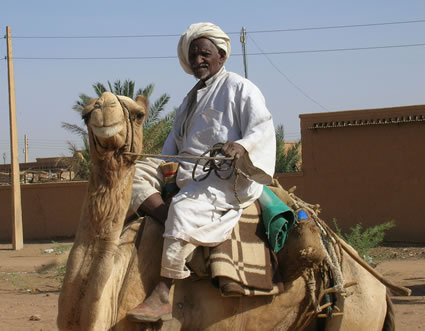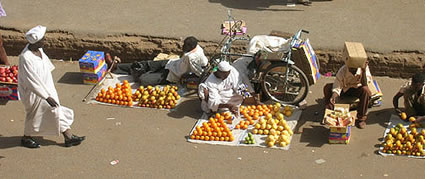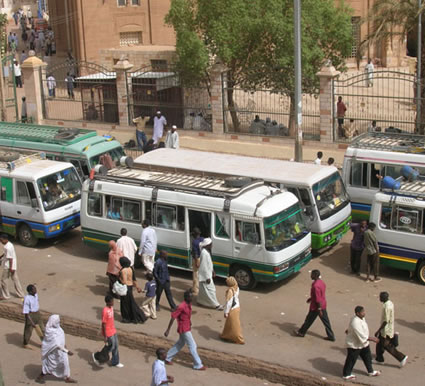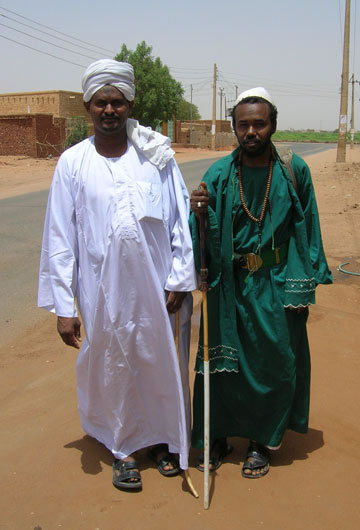 |
| Camel driver in Mygoma, a suburb near my home in Khartoum North. |
Shortly after I arrived in Sudan, one of my favorite male students quietly passed me a handwritten note, whispering that I should read it later.
After class, I read a charming explanation that because he was Muslim and I was a woman, he could not shake hands when we met.
“OK?” he asked, embarrassed, the next time we ran across each other.
“OK,” I confirmed, smiling, keeping my hands firmly behind my back and mortified that he felt the need to explain his actions.
Getting to Know Sudan
 |
| Fruit sellers in Souk el Arabi, the heart of Khartoum. |
In Sudan, such mistakes are easy to make. Whenever men meet, they shake hands with everyone in the room. Whenever, I walked into a room, they nearly all shook hands with me too. It is a charming custom, and you soon get in the habit of doing the same. But Khartoum is home to students from all over the Arab world, and those from Saudi Arabia, in particular, have been raised in a strict Muslim culture that believes men should not touch women, especially those outside the family.
Most Sudanese Arabs—in Khartoum anyway--come across as moderate Muslims, and are usually curious about the West and surprisingly comfortable when discussing politics. They are also very hospitable and friendly to foreigners, so it is easy to forget that the government or fundamentalist Muslims may not share the same relaxed attitude.
In addition, at least 19 major ethnic groups live in Sudan, divided into nearly 600 subgroups, and only 40 percent of them identify themselves as Arabs. In Khartoum itself, the many students from South Sudan or Darfur (in the far west of the country) follow Christian or other religions, and far different customs. Given such a complicated setting, knowing where the boundaries lie can be very tricky.
An Unfortunate Incident
I thought of these things when I returned to Vancouver last August, and the Gillian Gibbons affair flared up shortly afterward. Gibbons was the British teacher who went to Khartoum to teach English to the Sudanese and ended up in jail for blasphemy as the consequence of allowing her kids to name a teddy bear Mohammed. After an international outcry, she was released after eight days in custody and flew back to Britain.
I left Khartoum shortly before Gibbons arrived, but passed the school she taught at regularly, rattling by in a crowded minibus on the way to Souk el Arabi. Unity High School was hidden almost entirely by high brick walls, with a classy sign noting it was founded in 1902, and the protected air of keeping out the riff-raff.
My primary thought about the teddy bear affair was that Gibbons was very unlucky. Teaching overseas in different cultures, you are pretty much bound to make some gaffes unwittingly, and usually students or fellow teachers correct you laughingly or quietly forgive you.
First Job Teaching in an Islamic Province in China
A first overseas teaching gig took me to Urumqi in China¹s remote northwestern province of Xinjiang. Most of the kids at the language school were Han Chinese--the largest ethnic group in the world--and what we in the West think of as Chinese. But in Xinjiang, at least half the population is Uyghur (pronounced Wee-gur in English), and the school also had Uyghur kids. These people are Muslim, speaking a language more in common with Turkish than anything else, writing in Arabic script, praying to Allah, the men wearing traditional skull caps and the women, shawls.
In many ways, I was more careful to avoid talking about religion in China than in Sudan. Most foreigners working in China know that discussing religion is a sensitive issue with Chinese authorities. Our teaching contract even stated that discussions about religion and politics should be avoided unless specifically requested by students. The fact that many missionaries disguised as teachers work in China made me even more determined not to discuss religion.
Occasionally, religion was difficult to ignore, however. One day, I was teaching from a textbook that included a picture of an English church.
Baffled, one of my Han Chinese students asked: “What is a church?”
We were living in a city full of mosques, used by the Uyghurs, and there was even a Catholic church in Urumqi. But the Han Chinese appeared to have no concept of religion at all.
I carefully defined a church and a mosque, wrote up a list of the world¹s major religions, and added the countries where each religion tended to be practiced. I never had any comeback from either kids or parents.
An Unwitting Faux Pas in Sudan
In Khartoum, I was in Muslim territory again, but this time teaching adults only and in a country where the government enforced Sharia (Muslim) law. A very different feeling. Alcohol was banned, live entertainment virtually non-existent, and my women students were divided about whether it was even acceptable for them to go to the movies with family members.
Apart from trying to shake hands when it was not always welcome, I made other cultural gaffes. I had seen female office staff playing solitaire on the computer. One of our teaching textbooks covered entertainment, so I took a pack of cards in to class and proceeded to teach students the English words for hearts, spades, clubs and diamonds, explaining the meanings, and getting the students practice their numbers.
“Do you play cards?” I asked Rana, one of the women.
“Women are not allowed to play cards in public,” she told me. “It is OK to play on the computer, but not with people. Only for men.”
How would I have guessed that? Needless to say, I quietly dropped the cards from my box of teaching tricks.
Perceptions and Misperceptions
 |
| Street scene in Souk el Arabi, near the school. |
After about three months of teaching, I was asked to help run an English club at the language school. The more advanced students were very curious about how Sudan was perceived in the West. I felt very sad to report that most people in North America had only heard about Darfur, thought all of Sudan was a very dangerous place to live, and had a very negative view of the country.
In turn, it was fascinating to hear their perceptions of the West. The Sudanese view of the U.S., in particular, appeared schizoid to me: They loved watching American TV shows beamed in by satellite from the Middle East, and many wanted to live there, enticed by watching soap operas, thrillers and a supposed world of riches. But at the same time, many thought the U.S. was a corrupt society, and were especially critical of George W. Bush¹s invasion of Iraq.
The U.S. government brought in trade sanctions against Sudan in 1997, but while I was there last year, cranked up the pressure on Khartoum, banning 31 Sudanese companies from American and international financial systems.
Discussing these sanctions and the U.S. role in Iraq, two of my students said they thought the American government was as bad, if not worse, than the Nazis. Many Sudanese certainly did not trust the U.S., and saw the United Nations--headquartered in New York--as an extension of the U.S. government. Now that Sudan is the third largest oil producer in Africa, they also saw the West’s preoccupation with Darfur as both neo-colonial interference and as a transparent desire for control over potential oilfields.
Ironically, while the West regards Sudan as a very dangerous place to live, some students had similar views about the U.S.
“Chicago is a very dangerous city,” one Sudanese man informed me, in great seriousness. “U.S. cities are very dangerous to live in, not like in Sudan. We are much safer here.”
“What about Darfur?” I said gently.
“That is different. That is fighting between tribes,” he said firmly.
If we temporarily suspend our thoughts about the tragedy of Darfur, the student had a point--hard though it might be to make anyone in the West understand. The streets of Khartoum did feel safe, and the Sudanese there were so hospitable that it was very difficult to imagine them fighting anyone.
Growing up in England, I felt far more aggression from teenage bikers gathering outside the Co-op each night in rural Somerset; from Friday night boozers in Durham City; or while walking home from Tooting Bec underground station in S.E. London. Since immigrating to Canada, I have also felt the need to watch my back far more in Vancouver’s downtown eastside than in Khartoum and its sister cities.
Whether you approve of Sharia law or not, living in a controlled society based on strict religious tenets is likely to produce less street crime.
For another discussion in the classroom, I had carefully planned a debate about capital punishment: comparing Canada¹s ban on the death penalty since 1961 with the situation in the U.S., where the majority of states have capital punishment. Should the death penalty be abolished, I asked?
I stepped back and waited for a lively discussion to begin. Instead, baffled silence filled the air. Finally, one of the bolder students said that of course the death penalty was necessary as a deterrent. All of the other students agreed. In Sudan, capital punishment is allowed, with death by hanging the most common method. And for them, this was not an interesting debate because it was so obvious that capital punishment was necessary.
Forced to play devil’s advocate, I quoted statistics showing that the Canadian murder rate had not increased after the death penalty was abolished, and neither had the U.S.’s murder rate decreased in states where executions were allowed. They were supremely unimpressed.
“If there is no death penalty, families will take the law into their own hands,” one student insisted.
They also told me that in Sudan, if someone is murdered, the family of the victim decided whether the murderer should suffer the death penalty, pay compensation, or be pardoned. A practice many victim’s rights groups in North America might prefer, I would venture.
Final Thoughts
 |
| Sudanese men in Mygoma, a suburb near my home in Khartoum North. |
Life in Khartoum is very hard. Unemployment is high, and those who do have jobs typically work six days a week. Electricity and transportation costs are very high relative to income, numerous power cuts plague the city, scorching heat numbs the brain and the men who work all have huge family responsibilities.
But daily life goes on. Most of my students were in their early 20s and had a degree. When I asked them about the biggest problem facing Sudan, they nearly all said: “Unemployment.” Occasionally, a student from Darfur would say: “Darfur,” but it was primarily their inability to find work that bothered them.
North Americans tend to focus on Darfur, in the far west of Sudan, where feeding those in refugee camps is undoubtedly an unresolved humanitarian crisis. But the major fighting and atrocities were carried out four or five years ago.
As I write this, the uneasy peace between South Sudan and the Sudanese government in the north seems very fragile once again and poses a far more serious threat. The last civil war between the mainly black South Sudan and the northern Arab government ended with a peace accord in 2005 after twenty years of fighting. But the unresolved dispute over who owns the lucrative oil fields on the border near Abyei threatens to plunge the nation into civil war again.
Sitting safely at home in Canada, it is easy to for us to forget that most of the people of Sudan just want to carry on an ordinary life without fighting. Government wishes are not the same as those of their citizens. I can only think of all the welcoming faces in Khartoum and their willingness to look at the person in front of them and not just their politics or religion.
|

Nenhum comentário:
Postar um comentário